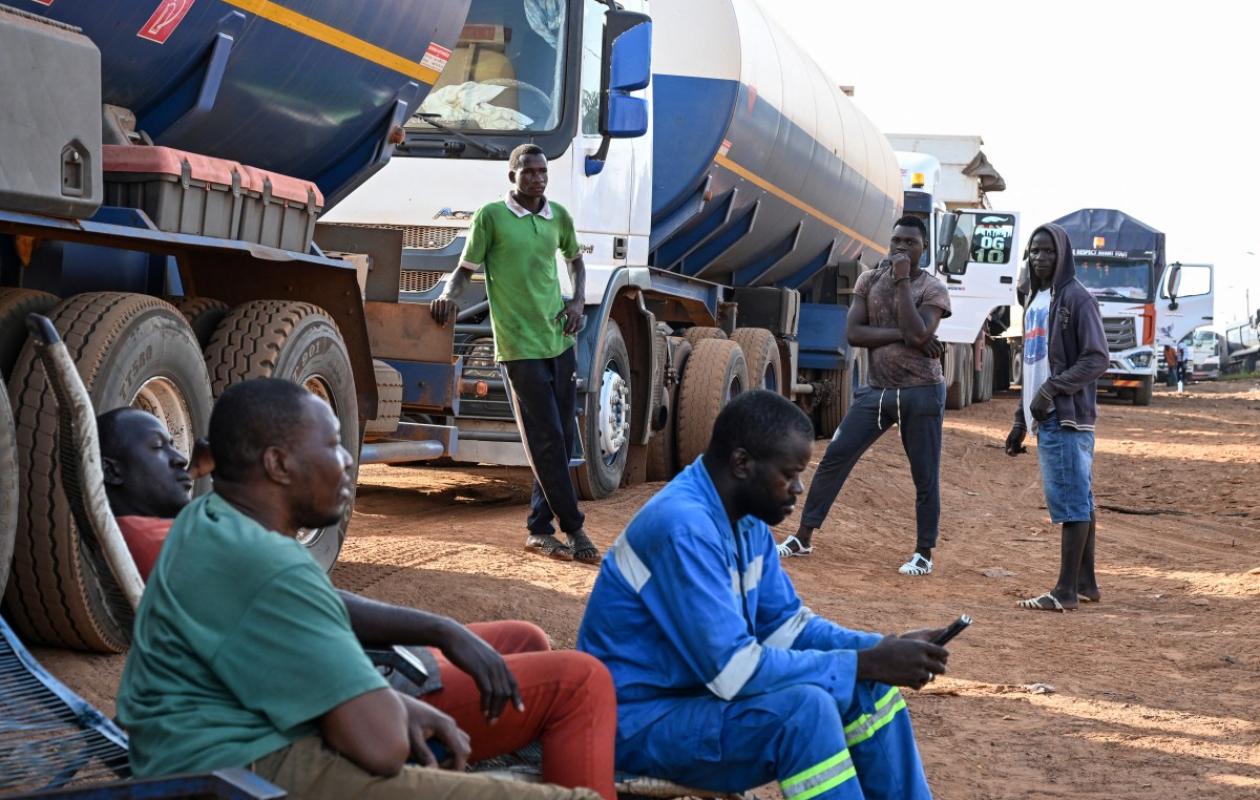
Carburant de "sang": ces chauffeurs routiers qui défient la mort pour ravitailler Bamako
"You never know if you'll come back alive," Baba whispers, his gaze lost in the void. In northern Ivory Coast, he and dozens of his colleagues are preparing to head back to neighboring Mali, aboard their tanker trucks loaded with fuel and anxiety.
One acronym sends shivers down the spines of all truck drivers: JNIM, named after the jihadist group affiliated with Al-Qaeda which decreed two months ago that no more tanker trucks would enter Mali from a neighbouring state.
Since then, the number of trucks set on fire coming from Abidjan or Dakar has reached into the hundreds, and is part of the JNIM's economic jihad strategy which seeks in particular to stifle Bamako and the military junta in power.
"By economically suffocating the country, JNIM seeks to gain popular support by accusing the military government of incompetence," notes Bakary Sambe of the Senegal-based think tank Timbuktu Institute, who refers to "a structural problem of insecurity."
Over more than 300 kilometers in northern Ivory Coast, from Niakaramandougou to Tengréla, the last town before Mali, AFP met dozens of drivers who explained that they continued to drive, driven by financial "necessity", "patriotism", and a good dose of courage.
"We do it because we love our country. We don't want Malians to run out of fuel," says Baba (name changed), 30, wearing a Manchester United jersey.
"If we die, it's for a good cause," said Mamadou Diallo, 55, gravely, taking a moment of respite in a parking lot in Niakaramandougou, five hours from the border.
The families, for their part, dread each departure. "But staying without work is impossible," sighs Yoro, another truck driver.
A little further north, in Kolia, Sidiki Dembélé is having lunch with a colleague, trucks lined up at the side of the road, engines purring softly, ready to leave again.
On the other side of the tarmac, to lighten the atmosphere, young people are playing "Y que fue", a Latin hit made famous by the world football star, Lamine Yamal.
"If the trucks stop, it's a whole country that dies," he explains, between bites of rice covered in peanut sauce.
In 2023, more than half of the petroleum products exported by Ivory Coast were destined for Mali.
Malian trucks are loaded in Yamoussoukro or Abidjan before using one of two corridors into their country: the Tengréla corridor or the Pogo corridor, where military escorts take over on the Malian side, all the way to Bamako. An escort can consist of several hundred tankers.
But even under escort, convoys are frequently targeted. The most dangerous areas in southern Mali are the Kadiana-Kolondiéba and Loulouni-Sikasso axes.
"Two months ago, I saw jihadists burning two trucks. The drivers died. I was right behind them. Miraculously, they let me through," says Moussa, 38, wearing a red polo shirt stained with oil.
Bablen Sacko also narrowly escaped an ambush.
"Apprentices died right behind us," he said. Then, in a firm voice: "Everyone has a role in building the country. Ours is to supply Mali with fuel. We do it out of patriotism."
But behind the pride lies bitterness. The drivers denounce appalling working conditions. "No contract, no insurance, no pension. If you die, it's over. After your funeral, you're forgotten," laments Bablen Sacko.
With a monthly salary of barely 100,000 CFA francs (152 euros) and a bonus of 50,000 (76 euros) per trip, Yoro is demanding a risk bonus, "because you never know if you'll come back alive".
Faced with this growing insecurity, some Ivorian transporters have given up on the Mali route.
In Boundiali, Broulaye Konaté, manager of a fleet of 45 trucks, preferred to immobilize his fleet.
"I asked a driver to deliver fertilizer to Mali. He refused. The truck is still parked in Abidjan," he said.
For Souleymane Traoré, an Ivorian driver who has been working on the Malian route for seven years, every journey is now an ordeal. "You take to the road with fear in your gut," he confides.
He remembers recently counting, on his way back to Ivory Coast, "fifty-two burnt-out tanks. And six more burned further on," between Kadiana and Tengréla.
Malian Prime Minister Abdoulaye Maïga recently described the fuel that Mali has been receiving lately as "human blood," in recognition of the soldiers and drivers killed on the roads.
"The situation should remain the same in the coming days regarding fuel supplies. On the political scene, there is more uncertainty: I do not think that JNIM has the capacity or the intention to take Bamako, but the threat they pose to the city is unprecedented," concludes Charlie Werb, analyst at the consulting firm Aldebaran Threat Consultants (ATC).
Commentaires (6)
AH les africains s'il y'a avait un tant soit peu de solidarité entre vous je suis sur que ce continent allait se développer d'une façon.
le Burkina a vite compris le danger et a préféré compter sur ses fils et on voit le résultat. Ils arrivent a endiguer la menace terroriste et meme à recupéré de nombreux territoires qui étaient sous le controle des terro. Le recent tour du Faso en est une belle illustration. Les maliens doivent copier sur cet exemple, chasser les soldats russses et entrainer et armer les fils du pays pour en découdre avce ces barbus drogués.
Participer à la Discussion
Règles de la communauté :
💡 Astuce : Utilisez des emojis depuis votre téléphone ou le module emoji ci-dessous. Cliquez sur GIF pour ajouter un GIF animé. Collez un lien X/Twitter ou TikTok pour l'afficher automatiquement.